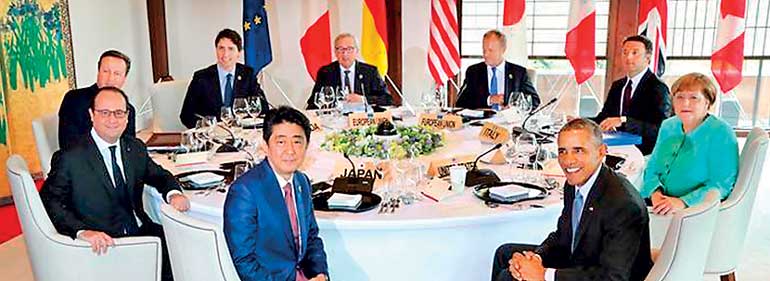Sunday Feb 22, 2026
Sunday Feb 22, 2026
Friday, 27 May 2016 00:00 - - {{hitsCtrl.values.hits}}
 Participants of the G7 summit meetings (from front in clockwise): Japanese Prime Minister Shinzo Abe, French President Francois Hollande, Britain’s Prime Minister David Cameron, Canadian Prime Minister Justin Trudeau, European Commission President Jean-Claude Juncker, European Council President Donald Tusk, Italy’s Prime Minister Matteo Renzi, German Chancellor Angela Merkel and U.S. President Barack Obama attend session 1 working lunch meeting at the Shima Kanko Hotel in Shima, Mie Prefecture, Japan 26 May
Participants of the G7 summit meetings (from front in clockwise): Japanese Prime Minister Shinzo Abe, French President Francois Hollande, Britain’s Prime Minister David Cameron, Canadian Prime Minister Justin Trudeau, European Commission President Jean-Claude Juncker, European Council President Donald Tusk, Italy’s Prime Minister Matteo Renzi, German Chancellor Angela Merkel and U.S. President Barack Obama attend session 1 working lunch meeting at the Shima Kanko Hotel in Shima, Mie Prefecture, Japan 26 May
Ise-Shima, Japan (Reuters): Group of Seven leaders voiced concern about emerging economies at a summit in Japan on Thursday as their host, Prime Minister Shinzo Abe, made a pointed comparison to the 2008 global financial crisis but not all his G7 partners appeared to agree.
The G7 leaders did agree on the need for flexible spending to spur world growth but the timing and amount depended on each country, Deputy Chief Cabinet Secretary Hiroshige Seko told reporters, adding some countries saw no need for such spending.
Britain and Germany have been resisting calls for fiscal stimulus.
“G7 leaders voiced the view that emerging economies are in a severe situation, although there were views that the current economic situation is not a crisis,” Seko said after the first day of a two-day G7 summit in Ise-Shima, central Japan.
Abe presented data showing global commodities prices fell 55 percent from June 2014 to January 2016, the same margin as from July 2008 to February 2009, after the Lehman collapse.
Lehman had been Wall Street’s fourth-largest investment bank when it filed for Chapter 11 protection on Sept. 15, 2008, making its bankruptcy by far the biggest in U.S. history. Its failure triggered the global financial crisis.
Abe hopes, some political insiders say, to use a G7 statement on the global economy as cover for a domestic fiscal package including the possible delay of a rise in the nation’s sales tax to 10% from 8% planned for next April. Obama told a news conference that he stressed the importance of pushing back against competitive currency devaluations, which some countries might be tempted to use to boost exports.
Other summit topics include terrorism, cyber security and maritime security, especially China’s increasing assertiveness in the East and South China Seas, where Beijing has territorial disputes with Japan and several Southeast Asian nations.
G7 leaders agreed that it was important to send a clear signal on the South and East China Seas, Seko told reporters, adding China was mentioned in discussions on maritime matters on Thursday.
At a news conference late on Wednesday, Abe said Japan welcomed China’s peaceful rise while repeating Tokyo’s opposition to acts that try to change the status quo by force and urging respect of the rule of law - principles expected to be mentioned in a statement after the summit.
Chinese Foreign Ministry spokeswoman Hua Chunying said the South China Sea issue had “nothing to do” with the G7 or any of its member states.
“China is resolutely opposed to individual countries hyping up the South China Sea for personal gain,” Hua said.
Obama pointed to the threat from North Korea’s nuclear and missile programs, saying the isolated state was “hell bent” on getting atomic weapons. But he said there had been improved responses from countries in the region like China that could reduce the risk of Pyongyang selling nuclear material.
G7 leaders were rattled by Republican presidential candidate Donald Trump, Obama said, adding Trump’s statements displayed ignorance and were aimed at getting headlines, not what was needed to keep America safe and the world on an even keel.
Summit pageantry began when Abe escorted G7 leaders to the Shinto religion’s holiest site, the Ise Grand Shrine in central Japan, dedicated to sun goddess Amaterasu Omikami, mythical ancestress of the emperor.
Abe has said he hopes the shrine visit will provide an insight to the heart of Japanese culture. Critics say he’s catering to a conservative base that wants to put religion back in politics and revive traditional values.
On Wednesday night, Abe met Obama for talks dominated by the arrest of a U.S. military base civilian worker in connection with the killing of a young woman on Japan’s southern Okinawa island, reluctant host to the bulk of the U.S. military in Japan.
The attack has marred Obama’s hopes of keeping his Japan trip strictly focused on his visit on Friday to Hiroshima, site of the world’s first atomic bombing, to highlight reconciliation between the two former World War Two foes and his nuclear anti-proliferation agenda.
The G7 groups Britain, Canada, France, Germany, Italy, Japan and the United States.